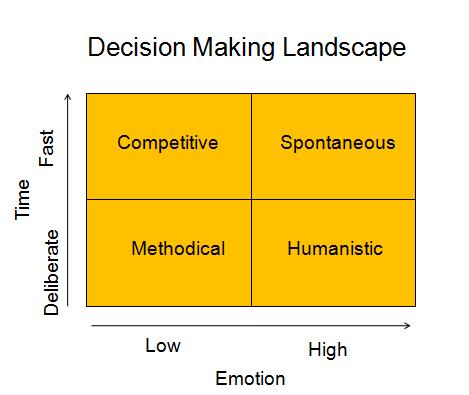Thanks to TopRank Online Marketing for the Image
Decision Methodology
Let's start off by considering the time that it takes to make a decision. How much time do you spend thinking, learning, or researching about a choice before you force yourself to make a decision. There are some different schools of thought here:
- your first instincts are usually your best
- to deliberate: learn as much as you can and let time give more information
- a continuum of various mixtures, that balances between those first two extremes
A balanced solution for important decisions should serve us well, and for simple choices our default response is fine. So the right answer depends on the type of decision we have to make. If it's an important decision we might want to sleep on it, or do a little more research. If there's something small that requires a choice, and doesn't have a lot of impact we can go with our gut and keep on moving. Discerning between the greater impact of any decision is a vital skill, that requires forward thinking.
So how do you decide which decision deserves your time and energy? The significance of this question determines the nature of our response. The best solution is an optimal efficiency tradeoff between your time and decision making ability. Unfortunately, our choice of resource management may only be reviewed as the effects of our decision are occuring. A surprising notion discussed at length by Malcolm Gladwell in blink is that we make decisions based heavily on first impressions. While often very effective, this type of instant cognitive ability can easily be tricked and Malcolm goes on to detail the nuances of this mental process.
Making continued choices may also impair our ability to make quality decisions. Many small or minor decisions actually cost us future decision accuracy (Making Choices Impairs Subsequent Self-Control).
There's a telling TED video of Dan Gilbert discussing delayed decision making and it's affect on relative happiness. If a decision is made but we are able to change our mind later on, we tend to agonize over it. We can't help but wonder if the alternative unselected option was the better choice.
While out walking I'm fortunate enough to combine free thinking for hours. While my mind wanders, many decisions I'm debating have plenty of processing time. This usually leads to more questions, and further research, and can lead to being distracted. I'm a big fan of sleeping on really important decisions, because we have this whole other mental state, the sub-conscious state, to help us process information. Psychologists and Neurologists can give you much more detail about the subsconscious than I. But in my experience sleeping on a difficult problem can clear up a solution.
When it comes to making a decision your subconscious state can actually search potential futures. By simulating virtual worlds in dreams, we get a glimpse of what could be. When dreaming we believe they're our reality. We experience a simulated reality and respond to it with true feelings. These genuine feelings are in contrast to the irrational and bizzare choices we make within dreams. While much of the time we don't remember our dreams, I've been lucky enough to remember a few vivid ones.
Some techniques to using our subconscious state to help with important decisions:
- Upon waking a fleeting idea may still be fading from our mind. Jot a note to yourself for later review. Our subconscious is adept at picking out interesting topics or areas.
- Our perception changes a little when our subconscious is active. We simply see problems in a different way.
- Our mind can prepare us somewhat for tragedies, by experiencing nightmares
- Concentrating for a good length of time, directly before sleep. Many times, that will translate over to your subconscious the powerful background process to help
We don't understand the nuances of neuroscience yet, but we do recognize there are massive networks of synaptic connections between neurons. The activation waves within the network are likely candidates for our conscious perception and also our subconscious experiences. Why not make the most use of all of our mental resources when confronted with challenging problems?
[podcast]http://www.victusspiritus.com/audio/DecisionMaking.mp3[/podcast]
Related articles by Zemanta
- Malcolm Gladwell on spaghetti sauce (www.ted.com)
- Malcolm Gladwell Challenges the Idea of "Free" (tech.slashdot.org)
- Gladwell, Anderson, Godin, and Bad Brains (idiomag.com)
